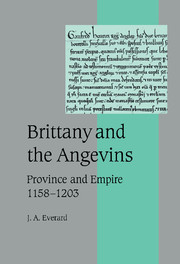Book contents
- Frontmatter
- Contents
- List of figures and maps
- Preface
- List of abbreviations
- Genealogy of the dukes of Brittany, 1066–1203
- The principal political divisions of Brittany, c. 1066
- Ducal domains, c. 1066–1186
- Introduction
- 1 Ducal Brittany, 1066–1166
- 2 Henry II and Brittany
- 3 The government of Brittany under Henry II
- 4 Duke Geoffrey and Brittany, 1166–1186
- 5 Duke Geoffrey, Henry II and the Angevin empire
- 6 The end of Angevin Brittany, 1186–1203
- Conclusion
- Appendices
- Bibliography
- Index
- Cambridge Studies in Medieval Life and Thought Fourth series
4 - Duke Geoffrey and Brittany, 1166–1186
Published online by Cambridge University Press: 15 December 2009
- Frontmatter
- Contents
- List of figures and maps
- Preface
- List of abbreviations
- Genealogy of the dukes of Brittany, 1066–1203
- The principal political divisions of Brittany, c. 1066
- Ducal domains, c. 1066–1186
- Introduction
- 1 Ducal Brittany, 1066–1166
- 2 Henry II and Brittany
- 3 The government of Brittany under Henry II
- 4 Duke Geoffrey and Brittany, 1166–1186
- 5 Duke Geoffrey, Henry II and the Angevin empire
- 6 The end of Angevin Brittany, 1186–1203
- Conclusion
- Appendices
- Bibliography
- Index
- Cambridge Studies in Medieval Life and Thought Fourth series
Summary
The two previous chapters have examined Henry II's acquisition and government of Brittany. Throughout most of the period discussed, from 1166, Henry II's younger son Geoffrey was universally acknowledged to be the future duke of Brittany, but he did not assume the government of the duchy until 1181. There was thus a period of fifteen years in which Geoffrey's position in respect of Brittany was somewhat ambiguous.
The conventional wisdom is that Geoffrey never ruled Brittany independently of Henry II, thus there is no significant distinction between the periods before and after 1181. On the contrary, 1181 is an important turning-point in the history of the Angevin regime in Brittany. This chapter will demonstrate that, although Geoffrey had no authority in Brittany before 1181, he ruled effectively independently of Henry II from 1181.
GEOFFREY ‘COMES BRITANNIE’, 1166–1181
That Geoffrey did not have any authority in Brittany before 1181, except in carrying out his father's orders, is indicated by the fact that there are no known acta of Geoffrey before he became duke of Brittany, except the writs of Henry II issued in their joint names. Neither is there any evidence that Geoffrey had a seal of his own before 1181.
Notwithstanding Geoffrey's lack of independent authority, he was closely involved with Brittany and Breton affairs. There are two aspects to this involvement. From the point-of-view of Henry II, Geoffrey played an active role in the Angevin regime, asserting royal authority in Brittany.
- Type
- Chapter
- Information
- Brittany and the AngevinsProvince and Empire 1158–1203, pp. 93 - 122Publisher: Cambridge University PressPrint publication year: 2000
- 1
- Cited by



